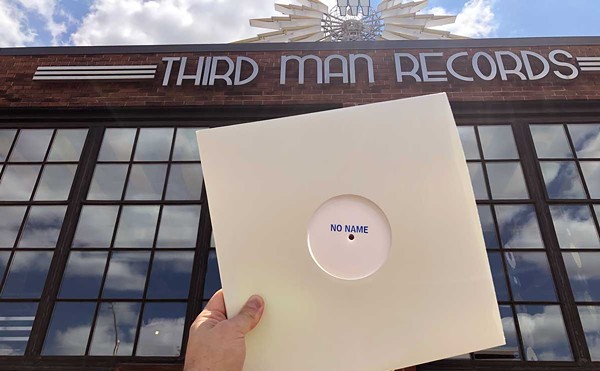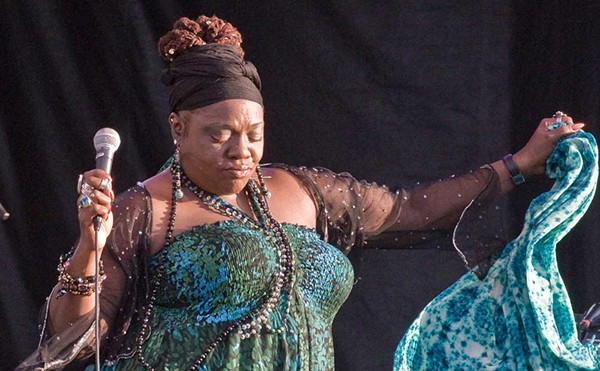Esham is, in conversation, an amicable dude. Not what you'd expect from the pioneer of "acid rap" — a hip-hop subgenre that's been criticized for its dark, satanic images — and an admitted influence on multi-platinum superstars like Eminem and Insane Clown Posse.
But the Detroit musician, whose 13th studio album, Sacrificial Lambz, hit stores in late August, has made some changes to his successful formula. And those changes aren't limited to music: He also plans to run for Detroit mayor soon. No kidding.
"I've been able to entertain people for 20 years," he says. "I just try to uplift people now. The latest things I do, I'm trying to get a message out to people, while I'm entertaining them at the same time. The jump to running for mayor is a pretty drastic change, but I just want to take a stance. If you don't stand for something, you'll fall for anything."
Esham — real name Rashaam Smith — grew up splitting time between Detroit and New York, living on the Motor City's east side with his mother and spending time with his grandmother in New York City every summer. As a firsthand witness to the East Coast's hip-hop boom and the advent of artists like Sugar Hill Gang and Run-DMC in the mid- to late-'80s, Esham fell in love with hip hop early on. He started to write lyrics himself soon thereafter, and his older brother encouraged him to take it more seriously.
"He felt like I had a dope flow, and he thought I could bring something new to the game, just coming from the city of Detroit," Esham says. "Back then, it wasn't really a [rap] music scene in Detroit. Everybody was just imitating what everybody else was doing."
Along with his love for hip hop, Esham always enjoyed the dark imagery of death metal and hardcore rock. Detroit, of course, has a staunch reputation for "Devil's Night," the night before Halloween when kids would sometimes set fires to houses and buildings in the area. Esham says that he "just exploited that, being the capitalist that I am," and he recorded his debut LP, Boomin' Words from Hell, about it in 1990. Esham, who was only 13 years old at that time, wrote the raps, produced the beats and even released the album all by himself — an approach that a lot of artists, especially in rap, try to emulate in an era when the Internet is vital and self-promotion is a necessity rather than a luxury.
"It was the crack era, when I made Boomin', and that's where all that really came from," the rapper says. "It was all an expression about ['70s-'80s drug cartel] Young Boys Incorporated, Mayor Coleman Young, the city we lived in and just the turmoil that our city was going through at the time. We referred to the streets of Detroit as 'Hell' on that record. So that's where my ideas came from. What I was doing hadn't been seen before — young guys getting in the game that early and being entrepreneurs before they even reach adolescence. A lot of people do it now because of the formula that we put out there, so to speak."
Esham would continue to pad his catalog and sharpen his skills, releasing album after album every one or two years. Establishing a fan base was difficult for him, though. Many hip-hop fans were writing off the dark imagery and satanic lyrics of his music as just shock value; the heavy metal facets of his records weren't connecting with the hip-hop community either. But Esham insists that though his controversial lyrics were describing how people really felt at the time, and his lyrical lack of political correctness worked against him.
"People were literally scared of my records," he says. "There have been so many rumors about me and my records. People got the first album, and they would just make up stories. They'd get into an accident and be like, 'I got into an accident because I was playing that tape.' It wasn't like we helped ourselves when we described what was in people's heads. It wasn't to shock people, though, but to get people involved in what we were doing. We had to get peoples' attention. ... We said a lot of things that people wanted to say but didn't say. We talked about a lot of political and social [issues] that people didn't want to talk about."
Eventually, however, people began to take notice. Esham's morbid rap would develop a cult following, and his influence would begin to show in other artists' music. Insane Clown Posse, the multiplatinum-selling Detroit rap duo known for its "evil clowns" personas have cited Esham as an influence. Eminem once alluded to himself on record as "a mixture between [Marilyn] Manson, Esham and Ozzy [Osbourne]." The phenomenon of rap-rock hybrids, capitalized on by the likes of Limp Bizkit, Korn, Kid Rock and others, can also be somewhat traced back to Esham's music as well.
"A lot of people go into my extensive back catalog and redo my ideas, and think they're coming up with something new," he says. "I'm flattered by a lot of it. I used to get upset, but the older I get, I realize that we were on a higher plane than a lot of people. In simple terms, they don't have enough game to put it out there the same way we put it out there.
"I've put more into this game than I've taken away from it. As opposed to just coming to the table with a knife and a fork, I brought the pig for people to eat up. I know that even though people might make more dollars or create more revenues based on things I've done in the past, I still feel like I'm spiritually richer than all of these people, just on my connection of a higher plane."
While Esham describes his newer music on Sacrificial Lambz as "wicked," he also insists that there's more positivity and substance. "Don't Give Up" is an uplifting number dedicated to people who are struggling. "Substance Abuse" finds Esham — whose "acid rap" describes music similar to LSD hallucinations — encouraging listeners to stay away from drugs. Tracks like "Root of All Evil" and "Garbitch" traverse more neutral territory, by handling such concepts as the power of money and the low quality of mainstream rap.
"I made [my first] record when I was 13," he repeats. "I was an adolescent. Wild. Didn't care about anything except getting money. From then till now, I was a kid. Well, I'm a grown man now. So my views have changed on certain things and the way I used to go about doing things. I'm doing them a little differently now."
Doing things differently also extends to his political activity. Esham told Metro Times that he's in the process of getting a petition signed so he can run for mayor of Detroit in the upcoming special election. While he admits it's a drastic step from rapper to mayor — which he insists would not be an issue — he believes it's the most convincing way that he can make a difference. If everything goes the way he wants, the rapper will go from talking about issues on records to actually solving them in office.
"I'm like a muse for people," he concludes. "I'll do something, and then everybody else will do it. I figure that if I jump in, maybe more young people will step up and try to get involved and change some of these things in their communities as well. Make it for the better."
William E. Ketchum III writes for Metro Times. Send comments to [email protected]




